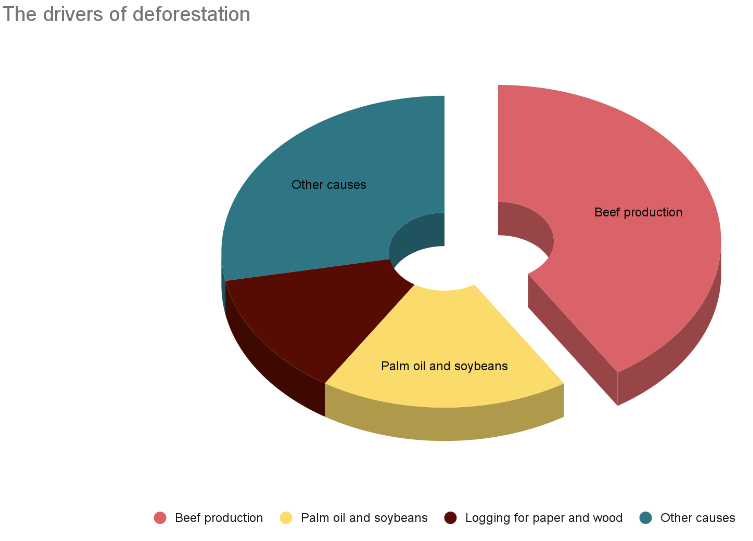Sustainable nutrition represents a sophisticated fusion of healthful consumption and minimal environmental impact, ensuring nutritional security for future generations. Presently, consumers are remarkably informed about the ecological implications of their dietary choices, with a focus on intelligent eating to bolster personal well-being. A diet with objectives—whether for weight loss or maintenance—is paramount, as it resonates with both personal health and planetary welfare.
The Role of Food in Sustainability
Food production and consumption exert significant environmental influence. Prevailing agricultural practices, including conventional farming and animal husbandry, are major contributors to deforestation, greenhouse emissions, and water contamination. Embracing a sustainable diet and plant-based options can dramatically diminish the pollution linked to food production.

Hannah Ritchie (2021) - “Cutting down forests: what are the drivers of deforestation?” Published online at OurWorldInData.org. Retrieved from: 'https://ourworldindata.org/what-are-drivers-deforestation' [Online Resource]
The Flexitarian diet endorses a rich variety of whole foods—fruits, vegetables, grains, legumes, nuts—with moderate inclusion of eggs, dairy, and occasional meat and poultry, offering adaptability that appeals to many.
Vegan Diet: A Dual Boon for Health and the Environment
A vegan diet, devoid of all animal products, is associated with a multitude of health benefits: improved cardiac health, lowered cholesterol, and a decrease in chronic disease risks. When executed with a focus on unprocessed foods, it also greatly reduces the environmental toll typically associated with animal agriculture, utilizing fewer water, land, and energy resources.
It’s important to distinguish between vegan and vegetarian diets—the latter includes eggs and dairy. Although vegetarianism is environmentally beneficial, the Flexitarian diet's inclusive nature often renders it more sustainable over the long term, emphasizing dietary additions rather than exclusions, which can be psychologically beneficial during the transition to healthier eating habits.
Skinny Pasta: The Epitome of Sustainable Nutrition
Skinny Pasta, derived from the konjac plant, epitomizes sustainable consumption. Its fiber-rich products, serving as a gluten substitute, not only acknowledge but champion the cause of sustainable eating. Skinny Pasta offers an assortment of low-carb, sugar-free, and gluten-free vegan choices, meeting the rising demand for eco-conscious food alternatives.
Opting for Skinny Pasta equates to relishing a flavorful, nutritious meal while supporting a brand committed to sustainability—a critical issue in contemporary international discourse given the escalating ecological damage.
A Proactive Force in Sustainability
Skinny Pasta transcends mere culinary delight; it is a proactive advocate for global betterment. Eschewing plastic packaging and endorsing sustainable agricultural methods, the brand embodies environmental stewardship.
The Advantages of Selecting Skinny Pasta
Choosing Skinny Pasta brings a suite of health benefits. Evidence indicates that low-carb diets facilitate weight control, stabilize blood sugar, and enhance energy levels. Skinny Pasta, a combination of konjac and water, serves as a pivotal element in the sustainable nutrition movement.
Mitigating Carbs and Sugars: Eco-Friendly and Health-Wise
Reducing carbohydrate and sugar intake benefits both health and the environment. Sugary beverages, for example, exert a substantial ecological footprint. By opting for healthier alternatives, we contribute to a more ecologically balanced world.

“Skinny pasta "cream" mashroom. Only 365 calories and extremely tasty" Credit: Skinny Pasta.
Environmental Impact Deconstructed
The environmental footprint is a stark reality. Traditional wheat products demand significant water and land resources and involve substantial pesticide use, delivering a dense calorie count and moderate fiber content.
Contrast this with konjac, the cornerstone of Skinny Pasta. With modest requirements for water and land, negligible pesticide reliance, and minimal calorie content, konjac is a dietary fiber powerhouse, courtesy of glucomannan.
Switching from sugar-laden beverages to healthier alternatives also represents a meaningful stride toward ecological equilibrium.

Concluding Thoughts: The Essence of Skinny Pasta
Skinny Pasta offers more than palatable nourishment; it presents eco-conscious dietary options compatible with a health-oriented lifestyle, offering invaluable benefits to those managing diabetes, fatty liver, or celiac disease. Skinny Pasta embodies food choices that are significant for both personal wellness and environmental health.
In embracing Skinny Pasta, one not only indulges in delightful, nutritious fare but also aligns with a brand deeply invested in sustainability at a time when global consciousness is increasingly attuned to our planet's preservation and the viability of its food sources.
The article was written in cooperation with Hadas Lapidot, Clinical Dietitian of Skinny Pasta
